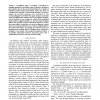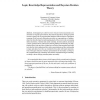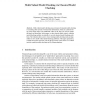40 search results - page 6 / 8 » The Belief Calculus and Uncertain Reasoning |
FUZZIEEE
2007
IEEE
14 years 1 months ago
2007
IEEE
— Possibilistic logic is essentially a formalism for handling qualitative uncertainty with an inference machinery that remains close to the one of classical logic. It is capable ...
CL
2000
Springer
13 years 11 months ago
2000
Springer
In this paper I give a brief overview of recent work on uncertainty inAI, and relate it to logical representations. Bayesian decision theory and logic are both normative frameworks...
AAAI
2006
13 years 8 months ago
2006
Partially observed actions are observations of action executions in which we are uncertain about the identity of objects, agents, or locations involved in the actions (e.g., we kn...
ICYCS
2008
IEEE
14 years 1 months ago
2008
IEEE
Most of modern systems for information retrieval, fusion and management have to deal more and more with information expressed quatitatively (by linguistic labels) since human repo...
CONCUR
2003
Springer
14 years 19 days ago
2003
Springer
Multi-valued model-checking is an extension of classical model-checking to reasoning about systems with uncertain information, which are common during early design stages. The addi...



